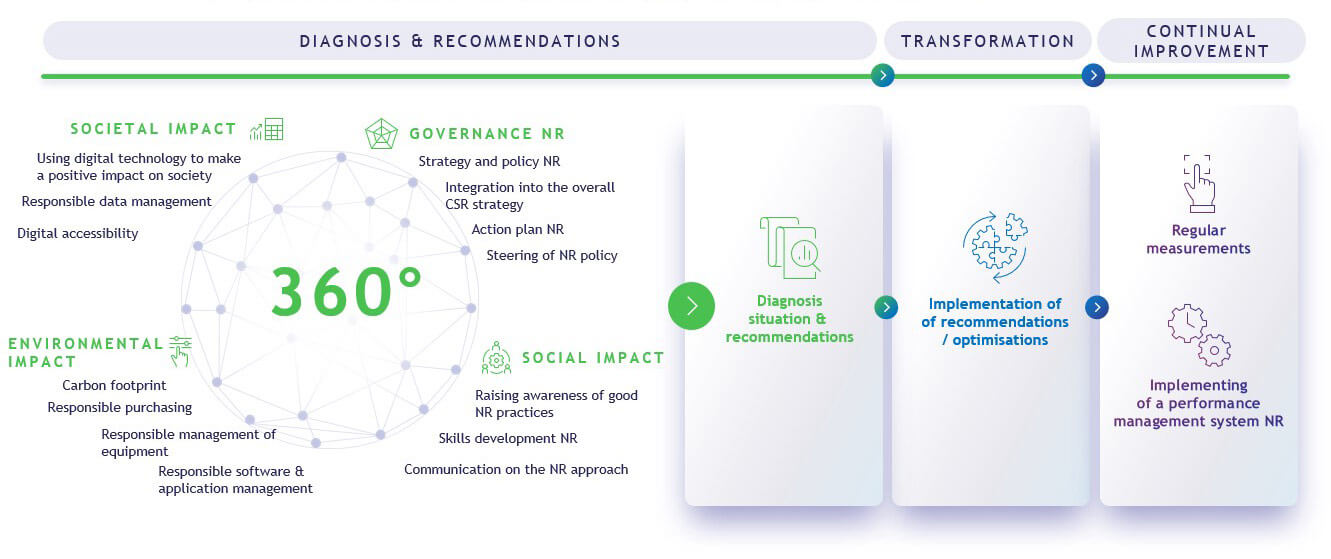Faced with the ever-increasing influence of digital technology on all aspects of sustainable development, the two firms have joined forces to create an innovative offering dedicated to CIOs.
The figures are clear: IT now accounts for 4% of the world’s greenhouse gas emissions. Twice as much as air transport. And to design a computer, you need no less than 22 kg of chemicals, 240 kg of fuel and 1.5 tonnes of water…

Chrisophe Dorin: “CIOs must be able to anticipate CSR policies”.
With this in mind, Lucernys decided to combine its expertise with that of
ekodev
an expert in CSR and climate strategy. They have just launched a joint approach to supporting CIOs in their digital responsibility initiatives, called
NR360
(for Numérique Responsable). “CIOs are increasingly challenged to make choices in line with the company’s CSR policy,” explains Christophe Dorin.Associate Director of Lucernys. It’s true that, with dematerialization, digital technology initially enjoyed a rather virtuous image, before appearing over time to have a significant ecological impact. This is hardly surprising, given that there are over 9 billion connected objects, smartphones and other computers in the world, and that the lifespan of a PC has been divided by three since the 1980s. The phenomenon eventually gave birth to the “Numérique Responsable” label, created in 2019 at the instigation of Ademe and WWF. “Today, this approach is still very new to the IT sector,” says Benjamin Dekester, Managing Partner ofekodev.
Co-sponsored by the two entities – themselves linked by EPSA, their common shareholder – the NR360 offering was designed to be consistent with this label, itself inspired by the ISO 26000 standard, which defines 7 main CSR pillars such as governance, the environment, responsible purchasing and data security. NR360 takes up this logic in a more targeted form, enabling a performance score to be defined and an initial set of recommendations to be drawn up, such as setting up a carbon footprint calculation, defining responsible purchasing criteria, etc.

Benjamin Dekester “We help CIOs make the right decisions”.
“We position ourselves as a compass for our customers, helping them to take the right direction.“Benjamin Dekester explains. “CIOs are rarely at the forefront of CSR issuesadds Christophe Dorin, but we want to help them become players, capable of anticipating what the company expects in terms of responsible digital business.“.
It goes without saying that, as the economy undergoes digital transformation, companies can no longer ignore CSR considerations. “This applies in particular to the role of information systems with regard to emerging reporting obligations, such as the CSRD and the Green Taxonomy.explains Benjamin Dekester of ekodev. Today’s information systems may be able to track corporate information, but they can’t distinguish between sustainable and unsustainable investments. How, then, can they comply with the new regulations requiring them to publish opex/capex investments dedicated to business sustainability?”
The same is true of Lucernys: “6 or 7 years ago, IT Departments were giving new iPhones to employees,” explains Christophe Dorin. Today, they are much more attached to a more responsible approach to terminal fleet management“.
NR360 is integrated into the global CIO performance diagnostics offering – dubbed
PERF360
from Lucernys. The latter covers a broader spectrum of IT topics, from security and governance to finance, quality of service and innovation. CSR is one of the subjects covered by this 360° diagnosis, but it has taken on increasing importance in people’s minds. Hence the idea of housing it in a separate offering that could be deployed independently of PERF360. “We’ve noticed that CIOs have new and specific expectations in terms of monitoring and KPIs specific to this subject“, concludes Christophe Dorin, who intends to make NR360 an effective and concrete first lever in the Green IT approach promoted by Lucernys.







